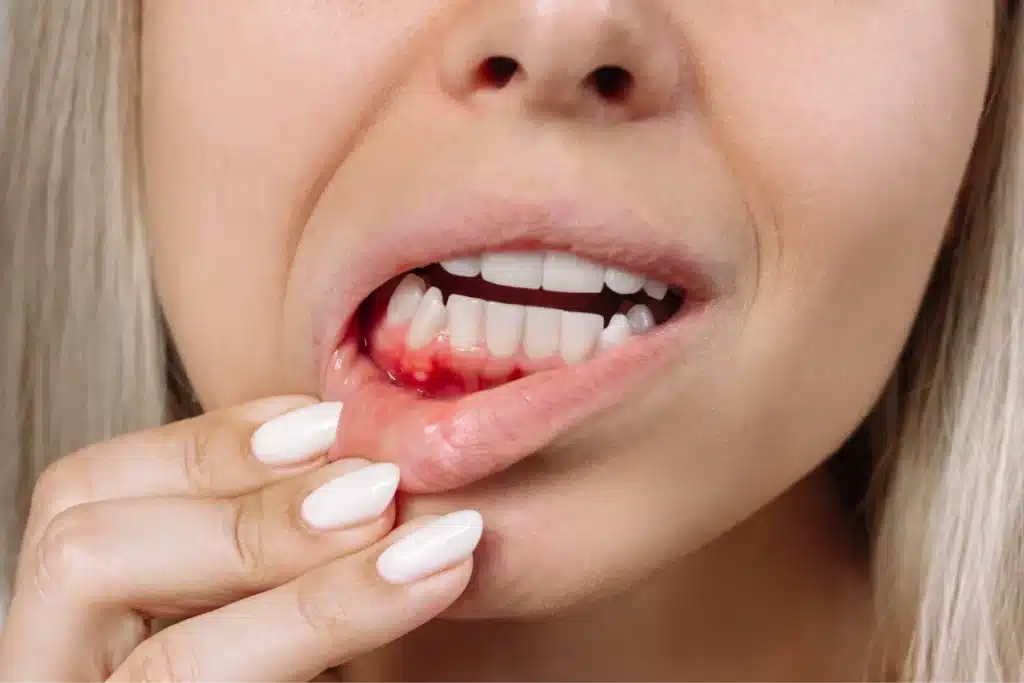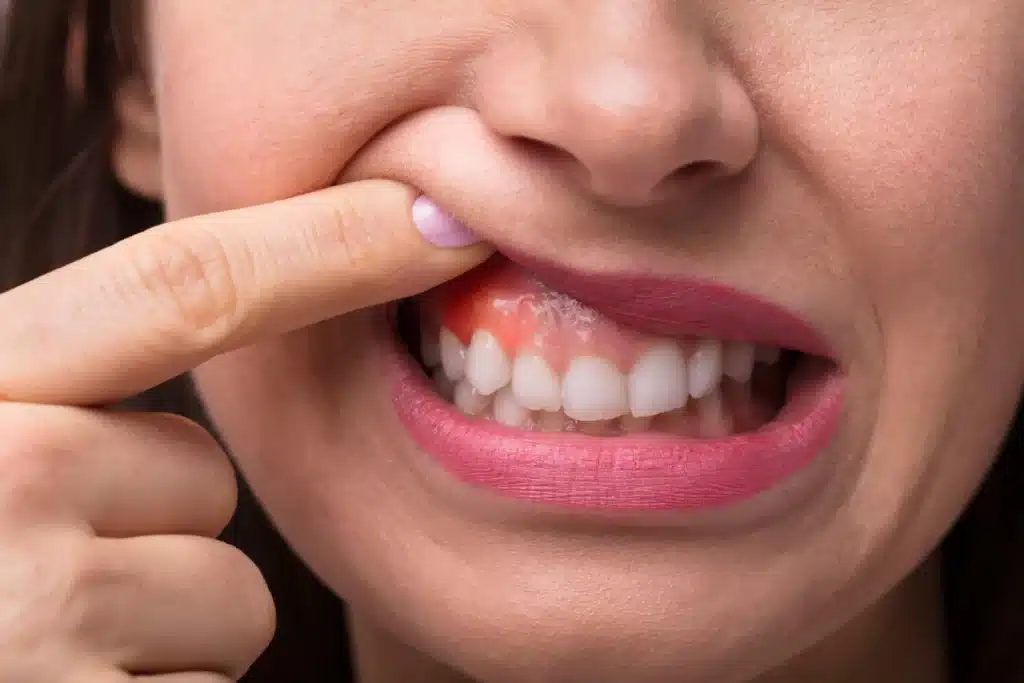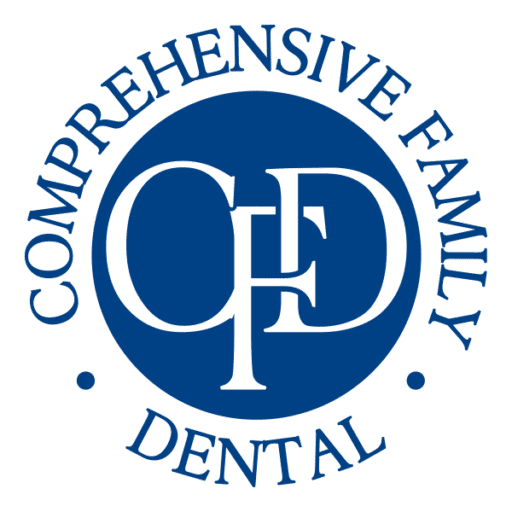Having healthy gums is crucial for maintaining a oral health. But what happens if you find yourself grappling with gum disease and can’t rush to a dentist immediately? Don’t worry! The good news is, you can implement a series of home remedies and lifestyle changes that can help you combat gum disease effectively. This article will guide you on how to cure gum disease without a dentist. But remember, these remedies should not replace regular dental check-ups but supplement them.
Understanding Gum Disease
Gum disease, formally known as periodontal disease, is a progressive dental condition affecting the gums and the supporting structures of our teeth. It’s crucial to understand the different stages of gum disease, and the corresponding symptoms to watch out for, to emphasize the need for early detection and treatment.
Stage 1: Gingivitis
Gingivitis is an early stage of gum disease. This condition is primarily caused by the buildup of plaque, a sticky film of bacteria that forms on the teeth when they are not adequately cleaned. If left untreated, gingivitis can progress to a more severe form of gum disease known as periodontitis, which can damage the soft tissue and bone supporting the teeth, potentially leading to tooth loss.
The good news is that gingivitis is reversible with proper oral hygiene. Regular brushing and flossing can help remove plaque and prevent its buildup, effectively treating and preventing gingivitis. Additionally, professional dental cleanings are crucial for removing tartar, the hardened form of plaque that cannot be eliminated with brushing and flossing alone. By maintaining a diligent oral hygiene routine and visiting the dentist regularly for check-ups and cleanings, individuals can significantly reduce their risk of developing gingivitis and maintain healthy gums and teeth.

Symptoms of Gingivitis:
- Red, swollen, or tender gums
- Bleeding gums, especially during brushing or flossing
- Persistent bad breath
- Receding gums
- Formation of pockets between the teeth and gums
While gingivitis is reversible with proper oral hygiene and professional dental care, it’s important to address it promptly. If left untreated, it can progress to a more severe form of gum disease called periodontitis.
Stage 2: Periodontitis
Periodontal disease is a severe gum infection that significantly affects the health of the gums and, if left untreated, can lead to the destruction of the bone that supports the teeth. Periodontal disease is primarily caused by the buildup of bacterial plaque on the teeth, which, if not adequately removed, turns into tartar and exacerbates the condition of periodontal disease. Recognizing the early signs of periodontal disease, such as bleeding, swollen, and red gums, is crucial for preventing its progression.
Treatment for this disease often involves deep cleaning procedures, such as scaling and root planing, to remove the plaque and tartar buildup around the teeth and below the gum line. In advanced cases of periodontal disease, surgical interventions may be necessary to restore the health of the gums. Preventing periodontal disease is largely achievable through diligent oral hygiene practices, including regular brushing, flossing, and professional dental cleanings. Periodontal disease has been linked to more significant health issues, including cardiovascular disease and diabetes, highlighting the importance of addressing periodontal disease promptly. Effective management and prevention of periodontal disease are essential for maintaining oral health.

Symptoms of Periodontitis:
- Persistent bad breath
- Receding gums that make the teeth appear longer
- Formation of deep pockets between the teeth and gums
- Loose or shifting teeth
- Gum line abscesses or pus between the teeth and gums
Periodontitis requires professional intervention from a dentist or periodontist to prevent further damage and tooth loss. If left untreated, it can lead to the destruction of the underlying bone structure, resulting in tooth loss.
Causes of Gum Disease
Before diving into treating gum disease without a dentist, let’s first understand the primary causes of this dental condition:
Plaque
The main culprit behind gum disease is plaque, a sticky film that contains bacteria.
Hormonal Changes
Changes during puberty, menstruation, pregnancy, and menopause can increase the risk of gingivitis.
Illnesses
Diseases like cancer, HIV, and diabetes can negatively impact gum health.
Medications
Certain medications can reduce saliva flow or cause abnormal growth of gum tissue, leading to periodontal issues.
Unhealthy Habits
Poor oral hygiene and smoking are significant contributors to periodontal disease.
Genetics
A family history of dental disease can make an individual more susceptible to gingivitis.

How to Cure Gum Disease Without a Dentist At Home
While professional treatment from dental professionals is crucial in controlling and treating gum disease, incorporating natural remedies into your overall strategy can also help. Here are some remedies you can try at home:
Green Tea
Green tea is rich in antioxidants that can potentially decrease inflammation. It may help combat the immune system’s inflammatory response to oral bacteria, reducing damage to gums and the jawbone. The polyphenols found in green tea can hinder the growth of bacteria, reducing gum inflammation. Drinking green tea is a healthy alternative to coffee and may improve overall health.
Hydrogen Peroxide
Hydrogen peroxide, a gentle antiseptic, is commonly used to prevent skin infections caused by minor cuts and scrapes. Swishing with diluted hydrogen peroxide can help alleviate minor mouth irritations and eliminate bacteria that may contribute to gum disease.
Aloe Vera
Aloe vera has a rich history of treating skin scrapes and burns, but it’s also been found to be useful in oral care. Research has shown that aloe vera is as effective as two commercial toothpastes at reducing disease-causing bacteria. Aloe vera gel can also aid in healing after gum surgery, leading to faster healing and less discomfort.
Turmeric Paste
Turmeric, a spice frequently utilized in curry dishes, possesses anti-inflammatory properties that may benefit the whole body. Furthermore, it has been shown to possess both antimicrobial and antioxidant properties.
Sage Mouthwash
Mouthwashes with high alcohol content can dry out the mouth, forming more bacterial plaque. However, rinses containing sage have been shown to soothe inflamed gums. Using sage mouthwash daily can help decrease the bacteria that cause dental plaque.
Saltwater
Using a saltwater solution is a natural way to disinfect the mouth and eliminate bacteria that cause gum disease. Additionally, it can help reduce inflammation in the mouth.
Lemongrass Oil
Using a mouthwash that contains a small amount of lemongrass oil can be effective in reducing bacterial plaque levels.
Baking Soda
Using sodium bicarbonate can benefit your teeth and gums as it can fight against harmful oral bacteria, neutralize acids that cause inflammation and damage, and even brighten your smile by breaking down stains.
Coconut Oil
Swishing your mouth with coconut oil for an extended period may help gum disease, but there’s not much credible research to support it.
Daily Brushing and Flossing
Brushing your teeth twice daily and flossing remain among the most effective home remedies for maintaining good oral health. By removing plaque and disrupting the bacteria that thrive on teeth and gums, you can eliminate the primary cause of bleeding gums and even gum disease.

Lifestyle Changes
Apart from home remedies, making certain lifestyle changes can go a long way in battling gum disease:
Quitting Smoking and Managing Stress
Smoking and chronic stress have been identified as risk factors for gum disease. Smoking weakens the immune system, making it more difficult for the body to fight off gum infections.
The Importance of a Balanced Diet
A balanced diet plays a vital role in oral health and can significantly impact the development and progression of gum disease.
Regular Dental Check-ups
Regular dental check-ups and maintaining good oral health practices play a significant role in identifying gum disease in its early stages.

When to Seek Professional Help
It is important to seek treatment for gingivitis as soon as possible to increase the chances of a quick and full recovery. If left untreated, gingivitis can cause significant damage to the teeth and lead to other health issues.
Final Thoughts
Taking control of your gum health doesn’t have to be a daunting task. By implementing good oral hygiene practices, incorporating natural remedies, adopting a healthy lifestyle, and knowing when to seek professional help, you can reduce the risk of gum disease.
And if the home remedies don’t give you relief, you should consider going to a dentist. Contact the specialists at Comprehensive Family Dental. They are more than equipped to help you get rid of periodontitis efficiently.

Frequently Asked Questions
Can I treat gum disease on my own?
Yes, you can treat mild stages of gum disease on your own using home remedies and maintaining good oral hygiene. The articles suggest various methods such as practicing good oral hygiene regularly, using natural remedies like green tea, hydrogen peroxide, aloe vera, turmeric paste, sage mouthwash, saltwater rinses, lemongrass oil, baking soda, and coconut oil pulling. These methods aim to reduce inflammation, fight bacteria, and promote gum health. However, it’s crucial to note that these home care tips should complement routine dental check-ups, not replace them. Instead of trying to cure gum disease in severe situations, professional dental treatment is necessary.
Can you get rid of gum disease without a dentist?
While mild gum disease can be managed and potentially reversed with diligent home care and natural remedies, advanced stages of gum disease require professional dental intervention. The articles emphasize the importance of early detection and treatment to prevent the progression of gum disease. Home remedies can help manage symptoms and improve oral health, but they may not be sufficient to get rid of advanced gum disease without the help of a dentist or periodontist.
What is the fastest way to get rid of a gum infection?
The fastest way to get rid of a gum infection involves a combination of maintaining excellent oral hygiene and using effective home remedies. Regular brushing and flossing, along with the use of saltwater rinses and natural antimicrobials like tea tree oil, coconut oil pulling, and turmeric paste, can provide quick relief from gum infection symptoms. However, for rapid and effective treatment of severe infections, consulting a dentist for professional cleaning, scaling, root planing, or antibiotic therapy is essential. Immediate professional care is the most effective way to address a gum infection quickly.


